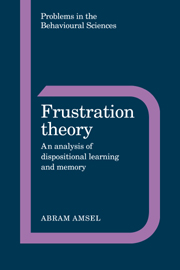Book contents
- Frontmatter
- Contents
- Preface
- List of abbreviations
- 1 Introduction: reward-schedule effects and dispositional learning
- 2 Motivational and associative mechanisms of behavior
- 3 Frustration theory: an overview of its experimental basis
- 4 Survival, durability, and transfer of persistence
- 5 Discrimination learning and prediscrimination effects
- 6 Alternatives and additions to frustration theory
- 7 Ontogeny of dispositional learning and the reward-schedule effects
- 8 Toward a developmental psychobiology of dispositional learning and memory
- 9 Summing up: steps in the psychobiological study of related behavioral effects
- 10 Applications to humans: a recapitulation and an addendum
- Appendix: some phenomena predicted or explained by frustration theory
- References
- Name index
- Subject index
1 - Introduction: reward-schedule effects and dispositional learning
Published online by Cambridge University Press: 20 March 2010
- Frontmatter
- Contents
- Preface
- List of abbreviations
- 1 Introduction: reward-schedule effects and dispositional learning
- 2 Motivational and associative mechanisms of behavior
- 3 Frustration theory: an overview of its experimental basis
- 4 Survival, durability, and transfer of persistence
- 5 Discrimination learning and prediscrimination effects
- 6 Alternatives and additions to frustration theory
- 7 Ontogeny of dispositional learning and the reward-schedule effects
- 8 Toward a developmental psychobiology of dispositional learning and memory
- 9 Summing up: steps in the psychobiological study of related behavioral effects
- 10 Applications to humans: a recapitulation and an addendum
- Appendix: some phenomena predicted or explained by frustration theory
- References
- Name index
- Subject index
Summary
In the history of the scientific study of learning and memory, a number of terms have been used to describe abstract experimental paradigms that purport to represent different kinds of learning and to reflect the distinct associative mechanisms that underlie them. We will have occasion in this book to refer to several of these experimental paradigms, but the most inclusive ones are classical (Pavlovian) conditioning and instrumental (Thorndikian) learning. As we shall see, these two paradigms are central to understanding the phenomena I call the reward-schedule effects. These phenomena of learning and memory depend on a variety of sequences of reward and nonreward, and are the basis for a family of generalizations known as frustration theory.
My major thesis, in general terms, is that inherent in such reward schedules is the buildup of primary frustration, defined simply as a temporary state that results when a response is nonreinforced (or nonrewarded in more neutral language in the appetitive case) in the presence of a reward expectancy; that this temporally labile state of frustration is subject to Pavlovian (or classical) conditioning, which is to say that a learned or anticipatory form can be elicited by an originally indifferent or neutral cue; that this conditional form of frustration, like other learned states, is therefore permanent, at least for that situation; and that, together, the primary (unlearned) form and the secondary (learned) form can account for a number of important processes in the dynamics of instrumental behavior.
- Type
- Chapter
- Information
- Frustration TheoryAn Analysis of Dispositional Learning and Memory, pp. 1 - 11Publisher: Cambridge University PressPrint publication year: 1992



